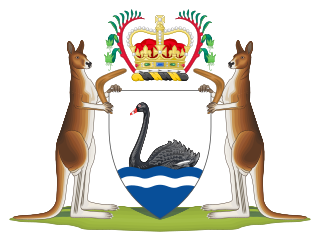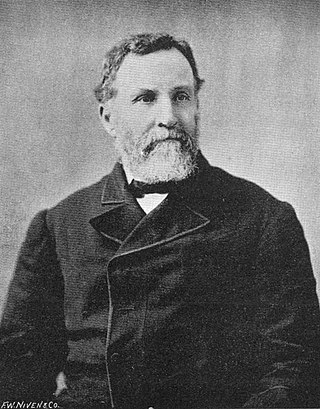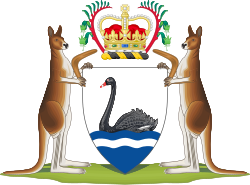
George Leake was the third Premier of Western Australia, serving from May to November 1901 and then again from December 1901 to his death.

Sir Walter Hartwell James, was the fifth Premier of Western Australia and an ardent supporter of the federation movement.

Sir Cornthwaite Hector William James Rason, better known as Hector Rason, was the seventh Premier of Western Australia.

The Throssell Ministry was the second Ministry of the Government of Western Australia. It succeeded the Forrest Ministry on 15 February 1901 after Sir John Forrest's move from state to federal politics, and was led by Forrest's choice of successor, George Throssell. However, no clear winner emerged from the April 1901 state election, and rather than test his support in the Assembly, Throssell and the Ministry he led resigned on 27 May 1901, allowing the Leake Ministry led by Opposition Leader George Leake to take office.
The First Leake Ministry was the third Ministry of the Government of Western Australia and was led by Premier George Leake, who had hitherto been the Leader of the Opposition. It succeeded the Throssell Ministry on 27 May 1901 after George Throssell's resignation as premier following the inconclusive result of the April 1901 state election.
The Morgans Ministry was the fourth ministry of the Government of Western Australia, led by Alf Morgans of the Ministerialist faction. It succeeded the First Leake Ministry on 21 November 1901, and was followed by the Second Leake Ministry on 23 December 1901.
The James Ministry was the sixth Ministry of the Government of Western Australia and was led by Premier Walter James. It succeeded the Second Leake Ministry on 1 July 1902 following the death of the previous Premier, George Leake, on 24 June 1902. The Ministry relied on Independent and Labour support, and the former Ministerial faction opposing them gradually dissolved with members either associating with the new Government or sitting as independents.

Frederick Illingworth, was an Australian politician, who was a Member of Parliament in two Australian colonies, and a government minister in Western Australia. As a financer of land speculation in Victoria in the 1880s, he was heavily involved in the Victorian land boom.

George Randell was an Australian businessman and politician. He served intermittently in the Parliament of Western Australia between 1875 and 1910, including as a minister in the government of Sir John Forrest.
This is a list of members of the Western Australian Legislative Assembly between the 1901 election and the 1904 election, together known as the Fourth Parliament.
The Rason Ministry was the 8th Ministry of the Government of Western Australia and was led by Ministerialist Premier Hector Rason. It succeeded the Daglish Ministry on 25 August 1905 after the previous Labor minority administration fell on a vote of no confidence. On 7 May 1906, it was followed by the Moore Ministry led by Minister for Lands Newton Moore.
The Moore Ministry was the 9th Ministry of the Government of Western Australia and was led by Ministerialist Premier Newton Moore. It succeeded the Rason Ministry on 7 May 1906 after Rason resigned to accept an appointment as Agent-General for Western Australia in London. It was succeeded by the First Wilson Ministry on 16 September 1910 after Moore resigned for exactly the same reason.
The Scaddan Ministry was the 11th Ministry of the Government of Western Australia and was led by Labor Premier John Scaddan. It succeeded the First Wilson Ministry led by Ministerialist Frank Wilson on 7 October 1911 after the decisive result of the state election held four days earlier, which had produced the State's first majority Labor government.
The Lefroy Ministry was the 13th Ministry of the Government of Western Australia and was led by Nationalist Premier Sir Henry Lefroy. It succeeded the Second Wilson Ministry on 28 June 1917 due to most members of the former Liberal Party, of which the previous Premier, Frank Wilson, had been the leader, pledging allegiance to the new party. The Lefroy Ministry, which was the first Coalition ministry in Western Australia, was also the only Ministry of a non-Labor government to be chosen by caucus.
The Colebatch Ministry was the 14th Ministry of the Government of Western Australia and was led by Nationalist Premier Hal Colebatch. It succeeded the Lefroy Ministry on 17 April 1919 after Sir Henry Lefroy's resignation as premier. Colebatch, a member of the Legislative Council and the first from that chamber to ever be asked to form a ministry, had the problem of finding a conveniently-located country seat which was not held by the Country Party. Before he could consolidate his leadership, his handling of the "Battle of the Barricades" on the waterfront severely damaged his standing and he stood aside. On 17 May 1919, the First Mitchell Ministry was formed by the Minister for Lands, James Mitchell.
The First Mitchell Ministry was the 15th Ministry of the Government of Western Australia and was led by Nationalist Premier James Mitchell. It succeeded the Colebatch Ministry on 17 May 1919 after the collapse of Hal Colebatch's brief service as Premier. It assumed a stability which had been absent from Western Australian politics since the 1914 election. The ministry was followed by the Collier Ministry on 15 April 1924 after the Nationalist coalition lost government at the state election held on 22 March.

The First Collier Ministry was the 16th Ministry of the Government of Western Australia and was led by Labor Premier Philip Collier. It succeeded the First Mitchell Ministry on 16 April 1924, following the defeat of the Nationalist government at the 1924 election on 22 March.
The Second Mitchell Ministry was the 17th Ministry of the Government of Western Australia and was led by Nationalist Premier Sir James Mitchell. It succeeded the First Collier Ministry on 23 April 1930, following the defeat of the Labor government at the 1930 election on 26 March.

The Minister for Education and Training is the member of the Government of Western Australia responsible for maintenance and improvement of Western Australia's system of education, and is answerable to the Parliament for all actions taken by the Department of Education under their authority. The holder of the office is usually an elected member of parliament from the ruling party or coalition, presently Tony Buti of the Labor Party.

Matthew Lewis Moss KC was a lawyer and politician who served in the Parliament of Western Australia on three separate occasions – in the Legislative Assembly from 1895 to 1897, and in the Legislative Council from 1900 to 1901 and again from 1902 to 1914. He was a minister in the governments of Alf Morgans (1901), Walter James (1902–1904), and Hector Rason (1905–1906). Moss was born in New Zealand and arrived in Western Australia in 1891. He left for England in 1914 and spent the rest of his life there, although he maintained connections with Australia, on two occasions acting as Agent-General for Western Australia.








